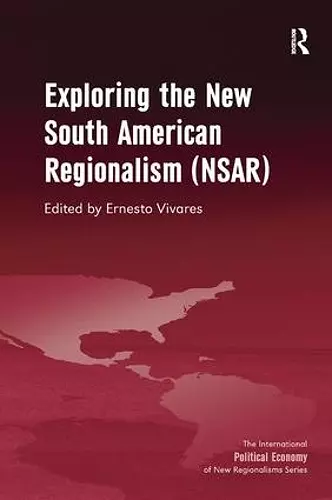Exploring the New South American Regionalism (NSAR)
Format:Hardback
Publisher:Taylor & Francis Ltd
Published:21st Mar '14
Currently unavailable, and unfortunately no date known when it will be back
This hardback is available in another edition too:
- Paperback£14.99(9781138270497)

The events and processes that have taken place in the last decade in South America have given way to one of the most interesting regional phenomena under a global crisis and within a changing world order. From the traditional status of Washington´s backyard and reign of economic and political stability, South America has increasingly turned into a region marked by a heterodox development in the light of other dominant regional tendencies of development-the European Union, NAFTA and the Asia Pacific. The political economic nature of the new South American regionalism (NSAR) is far from echoing the dominant interpretations about it, which reflects the major regional projects today. Given the reach and scope of the existing literature on the topic of the NSAR, there is an important gap concerning its academic exploration in relation to its nature of development, political economic complexity, challenges and orientations. In this sense, this book explores, from a wider and pluralist political economic perspective, the developmental dimensions of the NSAR within a changing hemispheric and world order in transformation. It analyses a set of specific debates: regionalism in the Americas then and now; social and economic development and regional integration; and organized crime, intelligence and defence. An in depth and critical reflection on the complex and heterogeneous path of regionalization taking place in South America from different perspectives and in key issues of regional development.
’This much-awaited book is the most impressive account of the regional dynamics of development in South America in recent decades. In a balanced way, it uncovers how the region is reconfigured by forces and changes from inside as well as outside the region. The book is also a major contribution to new and comparative regionalism more broadly. It is crucial reading for anyone who can accept that South American regionalism is not simply an emulation of regional projects and models in other parts of the world.’ Fredrik Söderbaum, University of Gothenburg, Sweden and United Nations University-Comparative Regional Integration Studies (UNU-CRIS), Belgium ’South America is undertaking daunting challenges in the politics of development. This book shows us what is at stake in the multiple areas of region building.’ Diana Tussie, FLACSO, Argentina
ISBN: 9781409469599
Dimensions: unknown
Weight: 635g
270 pages